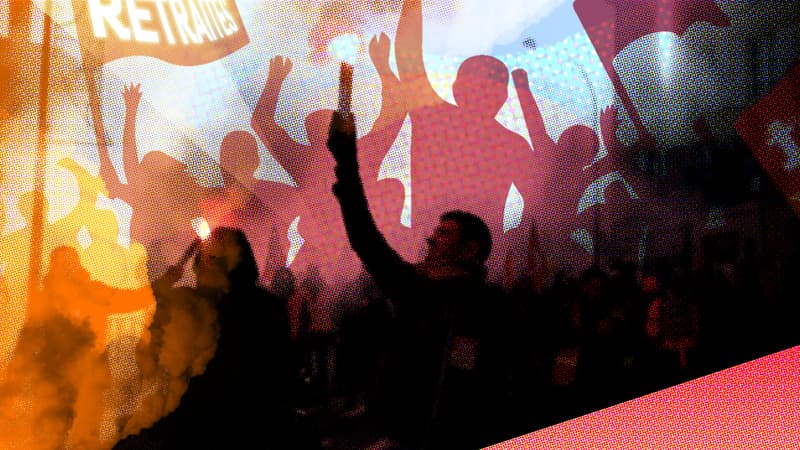An objective that the unions consider achievable. Facing the union front -united for the first time in 12 years-, can Emmanuel Macron abandon his idea of raising the retirement age to 64?
Although several large-scale strikes have led to the withdrawal of certain measures, as was the case in 1995 for Alain Juppé’s pension reform, the mobilizations have not been enough to make governments relent in recent years.
“Politicians only let go – and again, it is not always enough – if you have people on the street for a while and with a possible paralysis of the country,” sums up Raymond Soubie, former pension adviser to Nicolás Sarkozy at the Elysée. “On Thursday night we will have a first indication of the continuation for the government.”
The 2010 reform model
If the RATP and the SNCF are to be seriously disrupted this Thursday and the unions and the left call on the French to “take to the streets”, Macronie wants to be optimistic for now. He is not about to consider the slightest withdrawal of the government even in the case of a very strong strike.
“We do not expect that there will be no mobilization. There have been some with each pension reform so obviously there will be people. But if we let go in front of the street, that would mean saying that the vote is no longer useful for anything”, assures confident Guillaume Kasbarian, president of the economic affairs commission of the National Assembly.
Within the macronie, we have reviewed in recent days the history of the main social mobilizations. And many believe that the current environment is far from that of the great union victories, taking into account an example considered reassuring: that of the 2010 pension reform.
Éric Woerth, then Minister of Labor, defends raising the retirement age from 60 to 62 years. Answered by all the unions, this reform project took to the streets between 1.2 and 3.5 million on October 12, more people than in 1995 and 2003. But despite the blockade of gasoline tanks, the TGV stopped , a massive strike of garbage collectors, Universities blocked and 14 days of mobilization, the government does not let go.
Avoiding the “callous side” of government
Yet determination sometimes does not prevent governments from backing down under pressure from the streets, as happened in 1986 with the Devaquet bill, which sought to reform universities, or again in 1995 with Alain Juppé.
Far from considering dropping the ballast, the Matignon tenant launches “I stay upright in my boots”, after days of mobilization that brought together up to 2 million protesters. Before finally having to drop his bill under presidential pressure.
What pushes Emmanuel Macron to ask for his majority “humility”. The message, however, leaves Alain Madelin, Alain Juppé’s former economy minister, skeptical.
“We are not immune to a bad sequence that can set the powder on fire as part of a very powerful movement”, advances the one who had fiercely defended the pensions on points defended by Emmanuel Macron during his first five-year term.
The 1995 episode had also traumatized the right of the time. In 2003, a few days before a mobilization against the pension reform that seeks to extend the duration of contributions from 40 to 41 years, Jean-Pierre Raffarin conveys his message. “Parliament must decide, the street must march, but it is not the street that governs,” said the Prime Minister at the time, who did not back down despite relatively large strikes.
The CPE Spectrum
Three years later, the Élysée Palace, however, dropped the First Rental Contract (CPE) still approved in the National Assembly in the middle of nature, after weeks of youth mobilization. With a context that can give Elisabeth Borne some anguish: that of a very divided majority and very mobilizing student unions.
“At that time, there was a very strong internal contradiction between Nicolas Sarkozy and Dominique de Villepin,” recalls Danielle Tartakowsky, a historian specializing in social movements. “This result was largely contributed to by the withdrawal of the text.”
If for the moment, the presidential majority is maintained -despite the words of the former minister Barbara Pompili or the elected representative of Hérault Patrick Vignal, who plan to vote against the reform-, a break in the macronista unity could offer a boulevard to the unions.
Another anguish of the macronie, for the moment relativized in the ranks of the executive: that of the mobilization of the student unions that can block high schools, universities.
“You don’t have the question of less salary in terms of employees,” continues Nicolas Sarkozy’s former adviser.
“A protest that farts…”
Last unknown that can change the situation: that of possible scuffles, which could tilt opinion. “A demonstration that in the end explodes with black blocks, broken glass, injured policemen… It does not encourage much support for the strikers,” says a Renaissance deputy.
With Labor Law as an example. Despite extensive mobilization for weeks, the government defended the text in 2016 until its adoption by 49.3. “We felt a real change of heart after police officers were injured in a patrol car fire,” a former secretary of state deciphered at the time.
Currently, however, 56% of the French approve of mobilizing against the reform, according to our latest Elabe poll for BFMTV published on Wednesday. And 55% even say they understand “that the strikers are blockading the country” in an attempt to break the government.
Source: BFM TV


